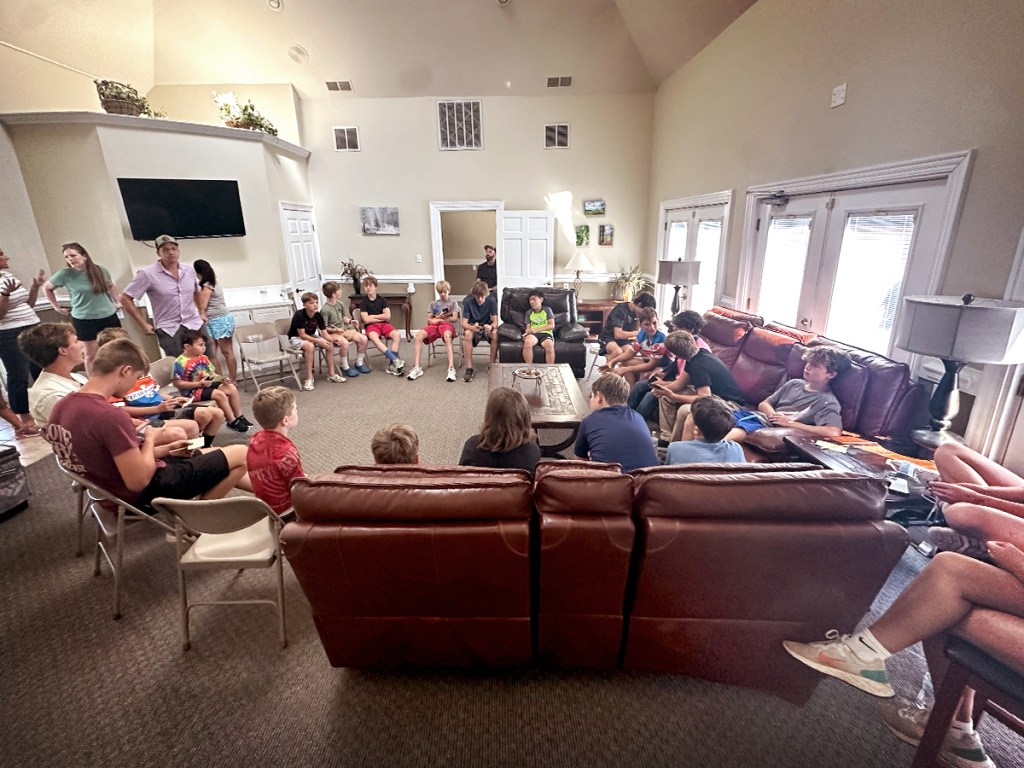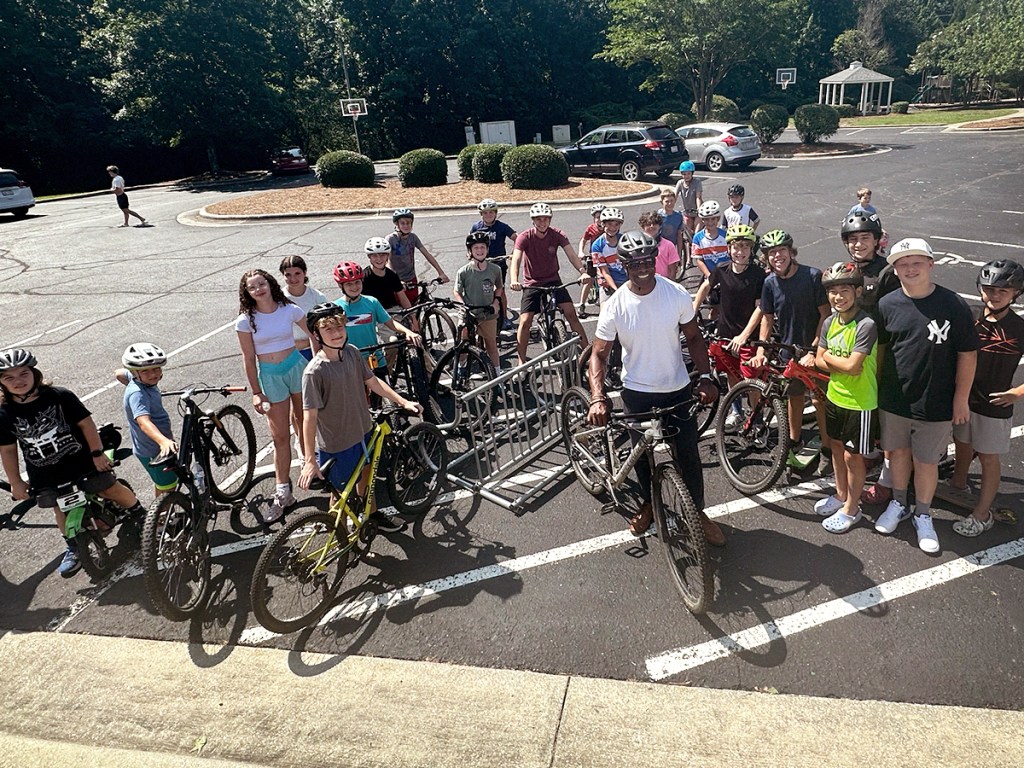For a good little while, the kids of Charleston Village in Apex had a better place to go than into the confines of digital screens.
On a forested parcel of town-owned land adjacent to the greenway that runs through their neighborhood, they built a series of bike jumps and other obstacles out of wood and logs, reinforced with dirt and debris that they’d cleared out of the culverts in a nearby creek.
“The space we created was more than just a place to ride bikes,” said Matthew Ashley, 13, during the public comments session at an Apex Town Council meeting earlier this month. “It was a community. It taught us to ride [trail] features, teamwork, and gave us a safe place with no bullying. It was a source of independence for us because it was accessible right in the neighborhood.”
But last year, complaints started rolling in from a few neighbors about aesthetics, noise, safety, and possible erosion (the property is located in a floodplain). An Apex police officer was called in one day last October—it was a positive interaction, the kids said, and they took a selfie together wearing helmets for bike safety—but several months later, on June 30, signs from town staff were posted warning that the bike jumps were going to be taken apart.
“We felt terrible about losing them, but we decided to take them down ourselves so that the town staff wouldn’t have to,” Ethan Otto, 13, told the town council on August 12.
It was a tough blow for the group of 30 or so kids who regularly used the jumps. Still, they weren’t willing to let go of the community they’d built.
Now, with the help of the nonprofit Triangle Off-Road Cyclists (TORC) and support of the town’s leadership, the kids are making the case for a town-sanctioned trail with a skills area that could replace the jumps. The trail would run on the 1.5-mile-long wooded stretch that runs alongside a portion of the greenway through Charleston Village, originating at the small, hilly tract of land that was home to the original jumps course. The idea would be that bikers and hikers could weave off and on between the paved greenway and the trails.
In addition to their neighborhood jumps, the kids, along with kids and adults from all over Wake County, are also grappling with the loss of nine miles of bike trails at Lake Crabtree Park. Many kids in Charleston Village are members of the Southern Wake Trail Hawks, a local mountain biking team for middle and high school students who practiced along the Lake Crabtree trails before they closed this summer.
As Triangle residents lose more and more recreational spaces to the forces of growth and new development, the kids and their advocates envision the proposed bike feature becoming a model for how towns across the Triangle could use large tracts of underused, forested, publicly-owned land.
Ashley, who spoke at the town council, says the jumps were the best way for him and his friends to get away from technology.
“Just like texting, ‘Yo, come to the jumps,’ and everyone would come. We’d have little challenges and stuff, and hang out,” he says from a seat in the Charleston Village pool’s clubhouse on a Sunday afternoon in August.

For Dylan Atkinson, 12, the jumps provided an escape from daily stresses.
“If I had a rough day at school, I would get everybody to come to the jumps, and that would just make me feel a lot better,” he says. “And we would hit the jumps, talk, and you almost forget about school. You go back the next day, you have a good day. And it goes on and on.”
When they learned they were losing the jumps, one of the neighborhood kids, Isaac Ashley, 11, a fifth-grader at the time, wrote an email to Mark Brothers, the president of TORC, to see if the nonprofit could help them build something that would be “more acceptable to the neighborhood and the town,” Brothers says. TORC is a volunteer-run organization that has two decades of experience building and maintaining trails all over the Triangle, including those at the now-closed Lake Crabtree, Briar Chapel, and others.
“I liked the way they were headed, and the fact that this was kids, it’s their idea and everything,” Brothers says.
He met with the group earlier this summer to walk the property and see if TORC could make some recommendations. And he liked what he saw.
“Single-track, natural surface trails next to the paved greenway is sort of an untapped resource in Wake County,” Brothers says. “[There are] not a lot of big pieces of forested property that you can put trails on. So being able to carve out a few miles of a trail that’s next to a greenway is a really great idea, if we could pull it off.”
There would be other benefits to partnering with TORC. The nonprofit could provide a Memorandum of Understanding (MOU) with the town to outline mutually agreed upon expectations for the trails, which could be renewed each year. It could also provide a certificate of insurance and a trail coordinator who could organize volunteer work days, maintain trail conditions, and act as a liaison. Finally, TORC could provide signage to inform riders of the trail rules and advise on their difficulty.
“What we would build would look nice, it would be safe, it would be sustainable,” Brothers says. “It would probably improve erosion. … So we could help them make it into a nice little skills area, and also just a trail for trail runners, mountain bikers, and hopefully extend this idea into other sections of the greenway systems.”
With TORC onboard, the kids took their next step: taking the plan to town leaders. Aidan Fielding, 15, along with some Charleston Village parents, emailed Apex mayor Jacques Gilbert asking him to meet with the community. The jumps were in the process of coming down when Gilbert visited, ice pops in tow.
Gilbert told the group about work he did in 2011 to bring Apex’s Rodgers Family Skate Plaza to fruition. Working as a town police captain at the time, Gilbert was tired of having to tell kids who were skateboarding around downtown Apex to move along each day. He began hosting skateboarding events on the weekends, and eventually partnered with a local business owner and ministry to find a permanent skate space.
“I shared that story, and how that all came to be, and said, ‘Hey, you guys need to figure out how to do it, but I would definitely be able to support you along the way.’”

Gilbert is realistic about some of the challenges the kids could face in trying to bring their vision to life.
There’s the fact that much of the property is in a flood plain, and any trails that get built would have to be ADA accessible. Gilbert says town staff is researching some ways “to keep it close to their area, for their neighborhood,” but hasn’t seen any plans yet.
“I’m going to advocate for them as mayor, and I think if they just keep their passion alive and work with me, we can get it done by convincing the rest of council that this is the right thing to do,” he says. Their presentation and remarks to the council earlier this month, which Gilbert had personally encouraged, was a good initial step.
The kids, meanwhile, are cleareyed about what they had—and what they want to see in the future.
“Imagine 30 kids outside, having the best time, learning how to ride, how to jump, how to challenge themselves,” Hunter Rockwood, 15, told the council. “Kids of all different ages, skill levels, just having fun, helping each other, and staying off screens with no bullying, no pressure, just a place where everyone felt included. That’s what the jumps gave us.”
Landon Thompsen, 15, closed the remarks by asking for support, guidance—and permission—to make sure the space remains “a safe, respectful, and welcoming space for everyone, now and years to come.”
“Imagine future kids discovering this spot, building their own friendships, learning teamwork, and finding the same joy and sense of belonging that we have,” he said. “Your support could help not just preserve a set of jumps, but a place where our community’s youth can grow, connect, and thrive.”
Send an email to Raleigh editor Jane Porter: [email protected]. Comment on this story at [email protected].
